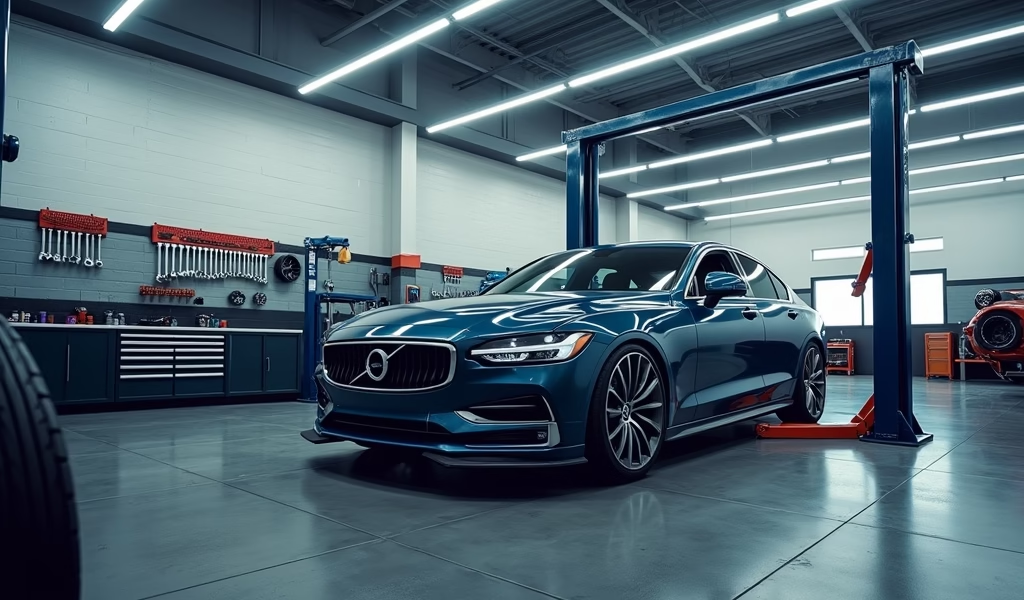Overview
Auto loan pre-approval gives car shoppers significant advantages by establishing their budget beforehand, strengthening their negotiating position at dealerships, and protecting them from predatory financing tactics. The article recommends getting pre-approved approximately two weeks before purchasing, comparing rates from multiple lenders, and using pre-approval strategically during negotiations to secure the best possible deal on both the vehicle price and financing terms.
Table of Contents
- Understanding Auto Loan Pre-Approval
- Benefits of Getting Pre-Approved
- Getting Your Documents in Order
- Timing Your Pre-Approval
- Shopping Around for the Best Rates
- Understanding How Pre-Approval Affects Your Credit
- Leveraging Your Pre-Approval at the Dealership
- Conclusion
- Frequently Asked Questions
Understanding Auto Loan Pre-Approval
Auto loan pre-approval is like having a mechanic inspect your finances before you hit the car lot. It gives you a clear picture of what you can afford, much like knowing your vehicle’s limits before a long road trip. When you get pre-approved for an auto loan, a lender reviews your credit history, income, and other financial details to determine how much they’re willing to lend you and at what interest rate.
Think of auto loan pre-approval as your financial toolkit – it helps you understand exactly what’s in your budget before you fall in love with that shiny new ride. As someone who’s helped countless folks navigate both car repairs and car purchases, I can tell you that knowing your numbers beforehand saves a ton of heartache later.
The pre-approval process typically involves submitting an application to a bank, credit union, or online lender. They’ll run a credit check and evaluate your debt-to-income ratio to determine your creditworthiness. Once approved, you’ll receive a letter or certificate indicating the loan amount and terms, usually valid for 30-90 days.
Just like you wouldn’t drive a car without checking the oil first, you shouldn’t shop for a vehicle without checking your financing options. Auto loan pre-approval puts you in the driver’s seat during negotiations and helps you focus on vehicles that truly fit your budget.
Benefits of Getting Pre-Approved
Getting pre-approved for an auto loan before visiting dealerships is like having a properly calibrated GPS for your car buying journey. It keeps you on track and prevents expensive detours. The most immediate benefit is knowing exactly how much car you can afford, which narrows your search and saves valuable time.
With pre-approval in hand, you transform from an uncertain shopper into a cash buyer at the dealership. This shifts the power dynamic significantly in your favor during negotiations. When dealers know you’ve already secured financing, they’re more likely to focus on the vehicle price rather than trying to profit from in-house financing packages.
Another major advantage is the protection against dealer markup on interest rates. Many folks don’t realize that dealerships often add percentage points to the rates offered by lenders – it’s how they make additional profit. Your pre-approval locks in a rate based on your actual creditworthiness, not what the dealer thinks they can get away with charging you.
Pre-approval also provides a valuable reality check. If the amount you qualify for is less than expected, you can adjust your expectations before emotional attachment to a vehicle clouds your judgment. This is similar to how we mechanics often have to give customers the hard truth about repair costs – better to know upfront than be surprised later.
Perhaps most importantly, shopping for a new car becomes much less stressful when the financing question is already settled. You can focus on finding the right vehicle rather than worrying about whether you’ll qualify for financing or get stuck with unfavorable terms.

Getting Your Documents in Order
Preparing for auto loan pre-approval is a lot like getting your car ready for inspection – you need all the right components in good working order. First things first, gather your personal identification documents including your driver’s license, social security number, and proof of residence like utility bills or a lease agreement.
Income verification is crucial, so have your recent pay stubs handy (usually the last 2-3 months worth). If you’re self-employed, you’ll likely need tax returns from the past two years. Lenders want to verify you have steady income to make those monthly payments, just like your engine needs a consistent fuel supply.
Details about your employment history are also important. Prepare information about your current employer, position, and length of employment. Lenders prefer to see stability here – jumping between jobs frequently can raise red flags, similar to how frequent mechanical issues might indicate deeper problems with a vehicle.
You’ll also need to provide information about your existing debts and monthly obligations. This helps lenders calculate your debt-to-income ratio, which is a critical factor in determining how much you can borrow. Think of this like your car’s weight distribution – too much weight (debt) makes for poor handling (financial flexibility).
Don’t forget to gather information about any assets you own, such as savings accounts, investments, or property. These can sometimes strengthen your application, especially if your credit history has a few dents and dings.
Organization is key here. Create a dedicated folder (digital or physical) with all these documents so you can quickly provide anything requested. Being prepared demonstrates your seriousness and financial responsibility to potential lenders, which can only help your cause.
Timing Your Pre-Approval
Timing your auto loan pre-approval is crucial, much like knowing when to replace your timing belt – too early or too late can cause problems. Ideally, you want to get pre-approved about 14 days before you plan to purchase a vehicle. This gives you enough time to compare offers while ensuring your pre-approval remains valid when you’re ready to buy.
Most pre-approvals are good for 30-90 days, depending on the lender. This window allows you to shop around without rushing, but not so long that your financial situation might change significantly. Think of it as your car shopping inspection period – long enough to be thorough, but with a definite expiration date.
It’s worth noting that multiple credit inquiries for auto loans within a 14-day period typically count as just one inquiry on your credit report. This is the credit bureaus’ way of acknowledging that you’re rate shopping, not applying for multiple loans. It’s like how multiple diagnostic tests on your car for the same problem shouldn’t each incur a separate fee.
Avoid getting pre-approved too early in your car buying journey. If you’re just starting to research models and aren’t ready to purchase for several months, wait until you’ve narrowed down your choices. Otherwise, your pre-approval might expire, forcing you to reapply and potentially taking another hit to your credit score.
Consider the timing of major life events as well. If you’re expecting a significant change in income, planning to move, or anticipating another major purchase soon, these factors could impact the terms of your loan approval. Just as you wouldn’t schedule major car repairs right before a road trip, try to space out major financial events.
Seasonal timing can also play a role. Dealers often offer special financing incentives at the end of the month, quarter, or year when they’re trying to meet sales targets. Having a pre-approval in hand during these periods gives you the best of both worlds – your secure financing plus whatever special offers might be available.
Shopping Around for the Best Rates
Shopping for auto loan rates is similar to finding the right parts for your vehicle – quality and compatibility matter, and prices can vary significantly. Start with your existing financial relationships. Your current bank or credit union often offers preferential rates to established customers, much like how a long-term relationship with a trusted mechanic might earn you priority service.
Don’t stop at just one quote, though. Online lenders have revolutionized the auto loan market with competitive rates and streamlined application processes. These digital-first options sometimes offer better terms than traditional brick-and-mortar institutions because of their lower overhead costs – think of them as the aftermarket alternatives that sometimes outperform factory parts.
Credit unions deserve special attention in your search. These member-owned institutions typically offer lower interest rates than traditional banks. According to the National Credit Union Administration, credit union auto loan rates average 1-2 percentage points lower than bank rates. That difference can save you hundreds or even thousands over the life of your loan.
When comparing offers, look beyond the interest rate. Pay attention to loan terms, including the length of the loan, any origination fees, prepayment penalties, and whether the rate is fixed or variable. Just as a cheap part might cost more in the long run if it fails prematurely, a loan with a slightly higher rate but better terms might be the better value.
Create a simple spreadsheet to track the various offers, calculating the total cost of each loan over its lifetime. This makes it easier to compare apples to apples. For a $25,000 loan, even a 1% difference in interest rate can mean over $1,250 in savings on a 5-year term.
Remember that comprehensive car buying guides often emphasize that dealer financing might sometimes beat your pre-approved offer, especially during promotional periods. Keep your pre-approval in your back pocket, but be open to dealer financing if they can genuinely beat your rate without extending the term or adding fees.

Understanding How Pre-Approval Affects Your Credit
When a lender pre-approves you for an auto loan, they perform what’s called a “hard inquiry” on your credit report. This is similar to how a diagnostic scan tool reads your car’s computer – it gives detailed information but leaves a small trace. Each hard inquiry typically causes a temporary dip of about 5-10 points in your credit score.
But don’t let this deter you from shopping around. Credit scoring models understand the concept of rate shopping, so multiple auto loan inquiries within a 14-45 day period (depending on the scoring model) count as just one inquiry. This is the credit world’s equivalent of allowing multiple diagnostic tests under one shop fee – they recognize you’re being diligent, not desperate.
If your credit score is already in excellent condition (think of it as a well-maintained vehicle), these small dips won’t significantly impact your overall creditworthiness. However, if your credit is already struggling (like a car with multiple mechanical issues), you’ll want to be more strategic about your applications.
The good news is that once you secure your auto loan and begin making regular payments, your credit score typically recovers from the inquiry dip within a few months. Better yet, those on-time payments actually strengthen your credit profile over time – similar to how regular maintenance improves your vehicle’s reliability and longevity.
It’s worth checking your credit reports before applying for pre-approval. According to the Federal Trade Commission, about 20% of consumers have errors on their credit reports that might affect their scores. Fixing these errors before applying is like addressing that check engine light before taking your car in for inspection.
If you’re planning other major financial moves soon – like applying for a mortgage – consider the timing of your auto loan pre-approval carefully. Spacing out major credit applications by at least six months gives your score time to recover between inquiries, ensuring you present the strongest possible credit profile for each application.
Leveraging Your Pre-Approval at the Dealership
Walking into a dealership with an auto loan pre-approval is like bringing your own diagnostic tools to a repair shop – it changes the entire dynamic. Your pre-approval effectively transforms you from a financing prospect into a cash buyer, which significantly strengthens your negotiating position.
Don’t show your pre-approval card too early in the game. Focus first on negotiating the vehicle price as if you’re paying cash, without discussing financing options. This approach forces the dealer to compete on the actual vehicle price rather than obscuring the true cost through complicated financing arrangements.
Once you’ve agreed on a fair price for the vehicle, then you can mention your pre-approved financing. This is when dealers might suddenly find they can offer you a better rate than they initially indicated – they’d rather make less profit on financing than lose the sale entirely. If they can genuinely beat your pre-approved rate without extending the term or adding fees, it’s worth considering.
Be wary of dealers trying to switch the conversation from the total price to monthly payments. This is a common tactic that can cost you thousands over the life of the loan. With your pre-approval in hand, you know exactly what you can afford both monthly and in total, which makes it harder for the sales team to use this strategy effectively.
Your pre-approval also gives you the power to decline unnecessary add-ons and extended warranties with confidence. Many car buyer guides point out that dealers often present these products as if they’re required for financing approval. With your own financing secured, you can evaluate these offerings purely on their merits, not from a position of perceived necessity.
If the dealer insists they can get you a better deal through their financing, ask them to put all the details in writing so you can compare the total cost against your pre-approval. Look for hidden fees, longer terms, or prepayment penalties that might make their offer less attractive than it initially appears. Like comparing two repair quotes, the lowest number isn’t always the best value.
Conclusion
Auto loan pre-approval is your financial safety harness in the often turbulent world of car buying. Just as a skilled mechanic prepares thoroughly before tackling a complex repair, preparing your finances before car shopping puts you in control of the entire process. With pre-approval in hand, you transform from a hopeful browser to a confident buyer with clear boundaries and expectations.
Remember that getting pre-approved doesn’t obligate you to use that specific financing. It simply gives you a powerful baseline against which to compare dealer offers. This flexibility, combined with the negotiating leverage pre-approval provides, makes it one of the most valuable tools in your car-buying toolkit.
The benefits extend beyond the purchase itself. By securing favorable loan terms, you’re setting yourself up for years of more manageable car ownership. Lower interest rates and appropriate loan lengths mean more of your money goes toward building equity rather than paying interest – much like how preventative maintenance saves you from costly repairs down the road.
So before you set foot on a car lot or click “buy” on that online listing, take the time to secure your auto loan pre-approval. It’s the equivalent of checking your engine oil before a long journey – a simple step that prevents major problems later. Your future self (and your wallet) will thank you for the preparation and care you took at the beginning of your car-buying journey.
Frequently Asked Questions
How long does auto loan pre-approval last?
Most auto loan pre-approvals are valid for 30-90 days, depending on the lender. Check your pre-approval letter for the exact expiration date.
Will getting pre-approved hurt my credit score?
It causes a small temporary dip (5-10 points) due to the hard inquiry. Multiple auto loan inquiries within 14-45 days typically count as just one inquiry.
What documents do I need for auto loan pre-approval?
You’ll need identification, proof of income (pay stubs), proof of residence, employment details, and information about your existing debts. Some lenders may require additional documentation based on your specific situation.
Can I get pre-approved with bad credit?
Yes, but you may face higher interest rates or need a larger down payment. Consider working with lenders who specialize in subprime loans or bringing a co-signer.
Should I get pre-approved before I start car shopping?
Absolutely, but time it about two weeks before you plan to purchase. This gives you a clear budget and stronger negotiating position without the pre-approval expiring before you find the right vehicle.

